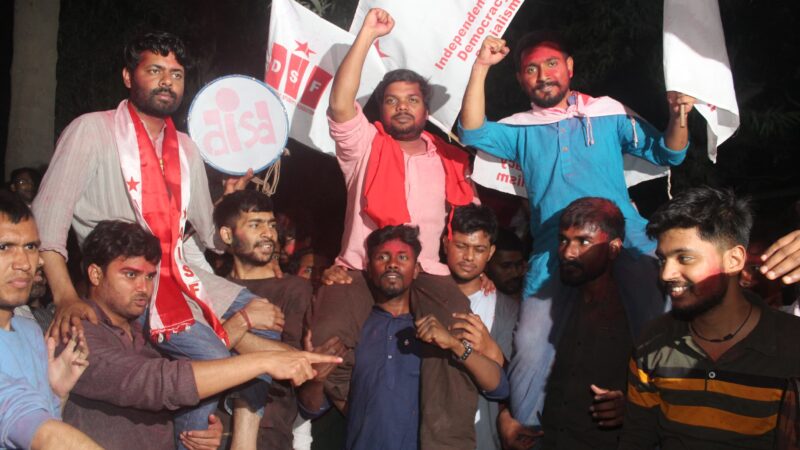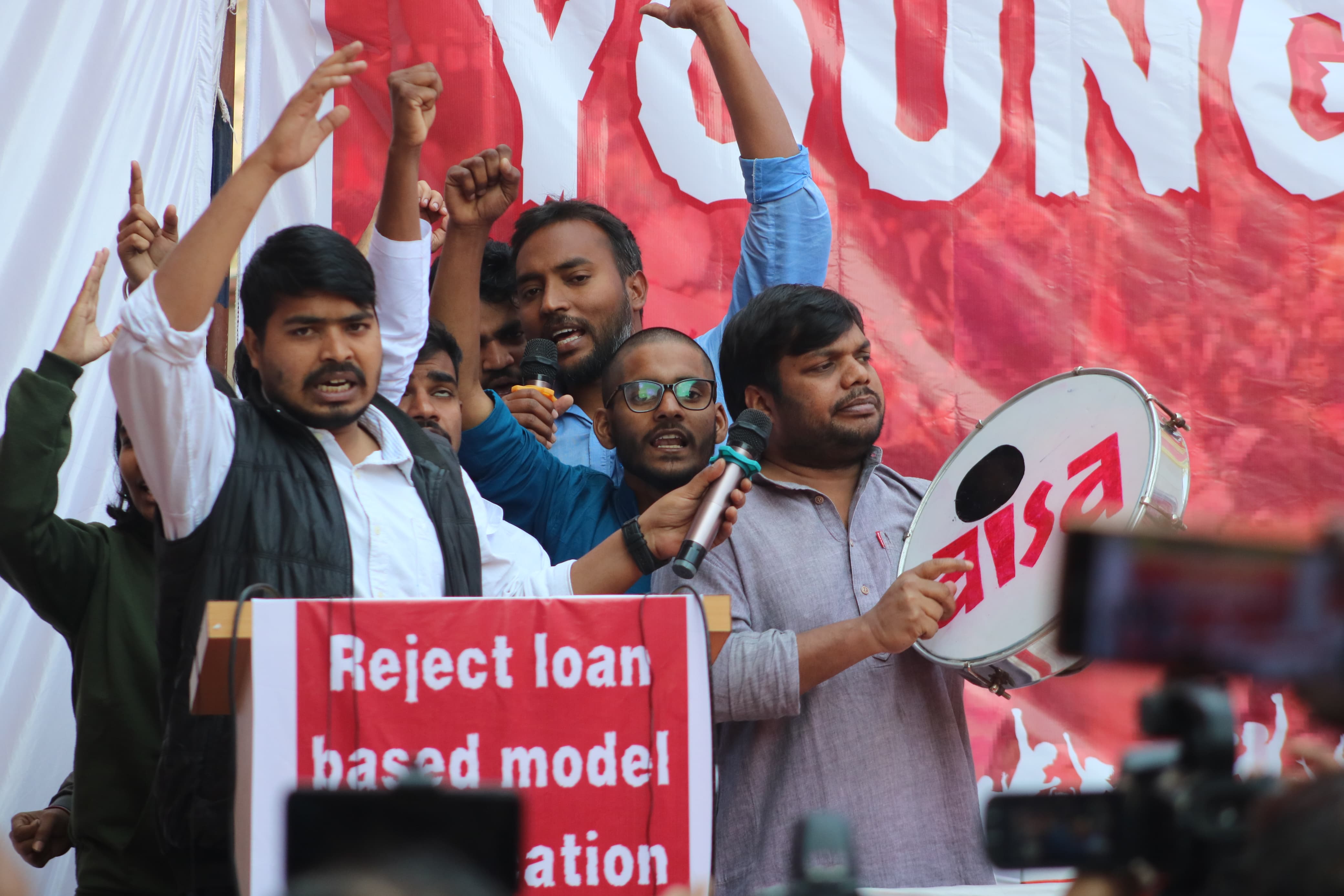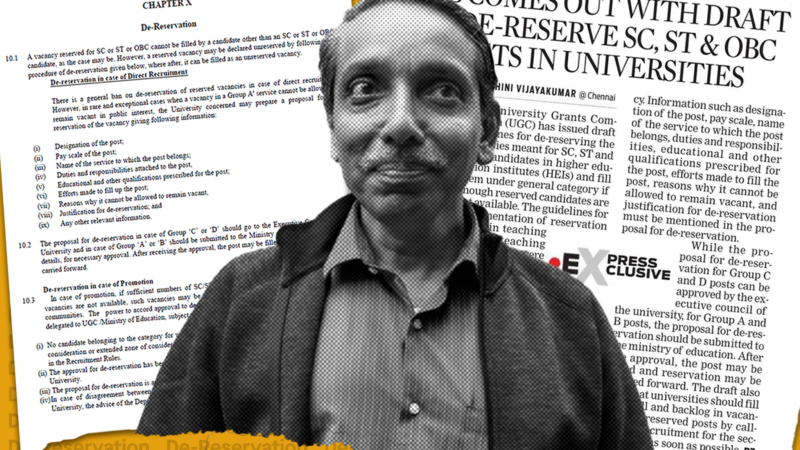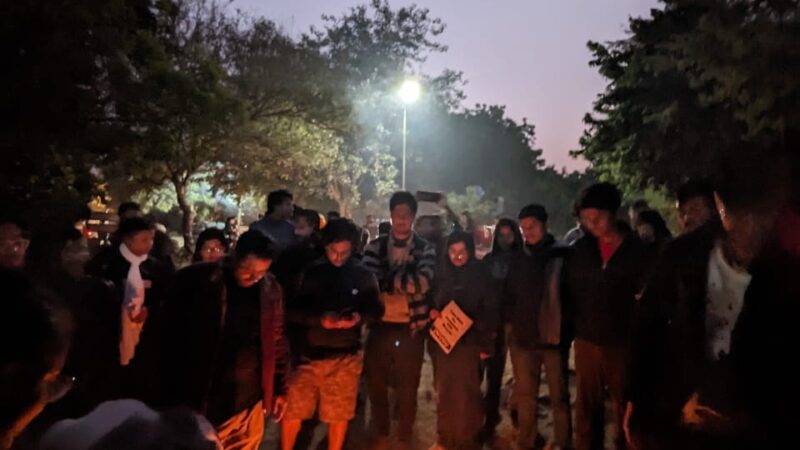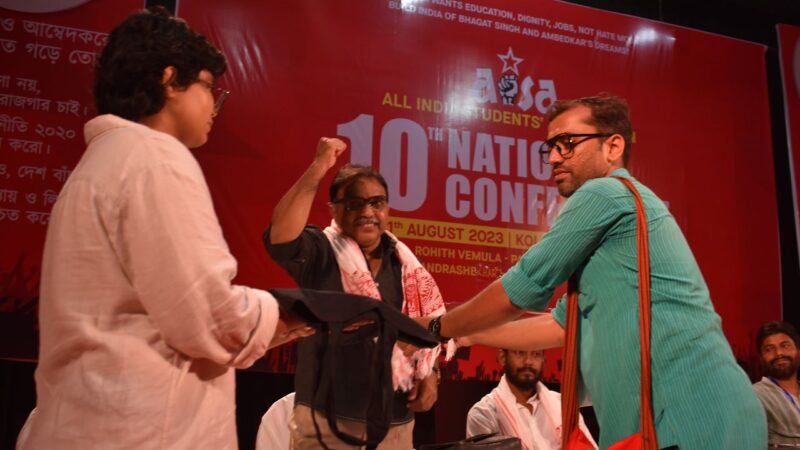Report on the TOYOTA Kirloskar Motor Employees Union (TKMEU) Protest against the accelerating worker Exploitation by the TKM authority

It has now been more than two months that the workers of Toyota Kirloskar Motor (TKM) manufacturing unit in Bidadi, Karnataka are protesting against horrible workload and unfair treatment of Toyota Kirloskar’s staff at Bidadi of nearly 6,000 of who around 3,500 are part of the Toyota Kirloskar Motor Employees Union (TKMEU), which is the organization leading the protest. TKM imposed an illegal lockout on November 10 that was briefly withdrawn, and was resumed on November 23, and was on again as workers continued to protest. The TKM wanted to raise the number of cars produced daily from 300 to 360 without any increase in manpower or timings, which led to the protest. The workers had alleged that the increase in workload was unscientific and illegal and was put in place without enough technical study.
Recently, on January 12, the company withdrew the lockout, mandating an undertaking of not participating in protests to be signed by the workers willing to get back to work. However, it is reported that of the 3,500 members who were on strike, only around 300 people have agreed to sign the undertaking and return to work, and the remaining will continue to be on strike. With employees having to sign an undertaking and the 66 employees belonging to the union being suspended, none of the striking employees’ demands has been addressed so far.
As an act of solidarity to the movement led by TKMEU, students from All India Student’s Association (AISA) visited TKM on January 9. After the solidarity demonstration, we divided ourselves into 4 groups and interacted with groups of workers independently to understand why the workers were forced to continue the protest. The compiled facts about their working conditions and the treatment that they get from the company, that came out of this exercise are as follows.
- From the time of recruitment, harsh policies, some of which in itself constitute several constitutional and labour law violations, have been implemented by the Company and this sets the tone for the remainder of the duration of employment. During recruitment, an intense physical examination is conducted where new entrants are made to run long distances within an impossibly short duration, do push-ups, crunches dips, and lift over 125 kg weights. The workers described the whole process as emotionally and physical exhausting, and worse than the military itself. Private investigators are hired to look into the backgrounds of these workers. Worse yet, they are made to strip down and full body medical examinations are conducted, upon which those individuals who have undergone conversion or are suspected homosexuals are rejected. This is a gross violation of several fundamental rights including but not limited to Articles 14 and 21. The Company only selects individuals from farming and other economically poor backgrounds in a deliberate attempt to create a relationship of financial dependence on the company so as to ensure that these workers have no other resort than to continue working despite the inhuman conditions.
- Workers in the first shift commence work at 5:35 am, but for many of them commuting to the factory alone takes two hours. They are expected to work continuously for 490 minutes and are only given a 10-minute break for food and restroom needs and a 10-minute break for exercise within this period. For the rest of the period, they are required to work with the same efficiency and speed since the production process is planned and work is allotted by the millisecond as per the Toyota Production System (TPS). Procedures established by the National Productivity Council are not followed and TPS dictates workplace regulations. There are several alarming safety issues in the company; the paint department uses artificial full compressing face mask which has caused sinuses, lung problems, and skin allergies in 4 people out of every 10 people, welding is done without proper exhaust, no safety mock drills are conducted for high risk enclosed areas. Despite all of this, there is no insurance for injuries suffered to skin and eyes as a result of this.
As for breaks, about 2000 workers are supposed to use around 30 washrooms and within this narrow time slot, which is an impossible task. Since the unit follows a conveyer system, they are not allowed to leave their positions until they are relieved by another worker. Sometimes there is a reliever for a group of 3-4 workmen, and sometimes there is one for every 20 men; on occasion there is no reliever at all and as a result, several workmen have problems relating to kidney stones. They are not allowed to take any breaks in excess of the prescribed period even by milliseconds, since it will reflect in deductions in their salaries. A perusal of the wage slips of the employees reveal that on most occasions, workers are not paid for the entire duration of 30 days. To illustrate, salaries are paid only for 29 days and 5 hours or 28 days and 8 hours as a result of such deductions. Such delays are documented as ‘unauthorized attendance’ and when they exceed 8 hours cumulatively, the worker is issued a show cause notice or an inquiry is initiated against him. One worker commented that if he were to go to a public toilet, it would only
cost him 2 rupees but Toyota’s policies are such that every time he uses the bathroom in the company, he loses at least 50 or 80 rupees since it is deducted from his salary.
Phones are not allowed during the entire shift. The company uses jammers within the unit to prevent any phone use. Landline facilities are available, but they are manned by supervisors who do not pass the message of family members in cases of emergencies or even deaths to the employees till their shift comes to an end. It is crucial to note that all of these restrictions are only for the workmen and none of the superiors.
- There is no scientific rationale for the implementation of such an intensive regime. The only explanation given is that the Japanese model follows such standards, so it should be possible for Indians to follow suit. The Japanese concept of Kaizen sees improvement in productivity as a gradual and methodical process. The workers are often shown videos of workers in Japan manufacturing the same car of the company, and are expected to do work on par with workers in Japan. However, the workers in Japan are provided with far better working conditions and work benefits, which are not provided to the workers here in India. The management is constantly seeking to reduce manpower and every year they increase pressure on the workers and deliberately worsen their working conditions to force them to enhance their performance. For instance, every year the time limit allotted for a particular work process is reduced because the company believes that years of experience equip the workman to perform the same task in a reduced time period. However, years of exposure to these inhumane conditions along with increasing age disallows any scope for increased efficiency.
- Issues relating to back, neck and shoulder pain is rampant among workmen and they have cited varying statistics ranging from 40% to 70% of workmen who face such injuries and yet no medical support has been provided to any of them. In fact, a worker revealed that the company doctor prescribes such high dosages of pain medication to force the workers to resume work immediately, that general pharmacies outside the company are not permitted to hand out these dosages without due prescriptions. Workers are threatened by managers of dire consequences if they report any accident or injury. Requests for reassignment of work that caused these injuries are habitually denied by management, and in fact, workers who have recovered from injuries are intentionally asked to perform similar physically exacting work. The Company organizes a medical camp annually as a mere façade to comply with ICMR guidelines where they conduct eye, blood and ear tests even
though actual problems the workers face are related to injuries to other parts of the body.
- The condition of workers has drastically worsened since the introduction of the Voluntary Separation Scheme (VSS). The management uses this to further harass workers, exacerbate existing poor working conditions, and force them to take the VSS scheme which offers them Rs. 25 lakhs to leave their job. Every time car sales go down, or for every individual who faces health risks, the scheme is forced on them. As a result of this scheme, no worker has been allowed to work till the age of retirement in the last 20 years nor has anybody availed the pension scheme from this company. 900 out of 4500 workers have already accepted this scheme as they were unable to cope with the harassment. In the last 2-3 years, the company has laid off nearly 1000 permanent employees in an attempt to transition to an exclusive Fixed Term Employment (FTE) or Contractual Hiring scheme.
This scheme is part of a larger agendum to downsize the number of permanent employees. Toyota, in collaboration with Suzuki, has planned to do away with all of their senior permanent employees by the year 2022 and they are thus the main targets of this scheme. No new permanent employees have been recruited since the year 2012.
The ‘Fixed Term Employment’ (FTE) scheme which may be dubbed as a mode of modern day enslavement is a major point of contention between the workers and the TKM authority. During the pandemic, the central government has unilaterally amended the Industrial Employment (Standing Orders) Central Rules and introduced fixed term employment as a means of employment in all sectors, despite the opposition of the Unions. Legally, now, workers employed in fixed term employments are not entitled for any notice or pay in lieu of termination of his service as a result of non-renewal of contract or employment or on the expiry of such contract period without it being renewed. Workmen engaged in “fixed term” are also disentitled from the protection against retrenchment under the ID Act. Very consciously the amendment has blurred the line between permanent employees and fixed term employees, paving the way for replacing permanent employment with fixed term employment for all practical purposes. In effect, this amendment permits managements to practice the unfair labour practices of employing a worker with the oblique motive to deprive the worker of her/his statutory right of permanent worker status. No wonder the TKM authority is trying very hard to shove this on the workers.
- During Covid-19, the conditions only worsened and exploitation has been exacerbated. The company transitioned from a 5-day to a 6-day work week. Yet the company failed to implement any safety regulations and as a result, around 600 workmen tested positive. No consequent medical facility has been provided to them.
- Unable to bear the worsening conditions, on the 6th of November, an elected member of the union went to talk to the managers about the inhuman working conditions of the Production line workers. Instead of listening to their grievances, the management cooked up stories that the member was inciting violence and threatening the officials. He was suspended the next day. In the past, the Union has been crucial in achieving Mediclaim, canteen facilities, travel allowances, and increased wages which the Company originally promised and set out to do. One of the permanent employees stated that after having worked several years at Toyota, he is being paid 45K, which he claims would not be more than 25K if not for the Union efforts. It comes as no surprise therefore that TKM authority aims to disband the union, and have constantly been dissuading them since its formation. They thus used the lock- out to suspend previously active members of the union on petty grounds like absence from the workstation and indiscipline.
- The lock-out itself is indisputably illegal since the Company failed to fulfil a previous order issued by them mandating the issuance of a notice 14 days prior to the implementation of the lock-out. Yet they continue to use the lockout to arbitrarily suspend and terminate the employment of several workers. Workers have been issued notices of suspension for merely chanting slogans, posting about the lock-out on social media and other such trivial instances.
- The Company allows no space for dissent. In the past when workers had organized strikes, the largest ones being in 2006 and 2014, the Company fired and suspended a large number of employees. Between 2004 and 2006, 42 employees were suspended and in 2014, 32 employees were suspended during a 37-day lock-out. The ‘chargesheet’ against those workers was only provided by the management after the lockout (without notice). Enquiries for those suspensions are yet to be held, six years later. All of these are blatant violations of labour laws.
- Workers are suspended to send a message to other protesting employees. There exists a permanent atmosphere of bureaucratic suppression of even the most minimal of protests from the workers at the factory. The process of chargesheeting the workers were used as a tool to oppress the workers in the
factory and to spread fear. This practice of arbitrary suspensions and issuance of notices is a common practice. Workers narrated instances where they have been issued with notices containing charges of indiscipline when they were unable to make it to work due to fact that their vehicles were stolen, their wives went into labour, or in cases of other family emergencies, including deaths. Even when medical reports by the Company doctor mandate a day’s worth of rest, the Company considers this as unauthorized leave. The company also only allows a period of 3 days as child care leave. Even though termination of employees during a lock-out is prohibited, the management chalks up all these instances of unauthorized leave over the course of the last 6-7 years to use this as a ground for termination. Workers who were protesting right opposite the factory were made to vacate the place by the company officials who pressurised the owner of the land to stop the gathering of workers in the land.
- The workers also stated that the protest although is energetic and spirited, they have been facing a lot of troubles financially. One of the workers told us that it is much easier for a young person in his mid twenties to be able to protest, than for a person who is in his late 30s or 40s, because of the social constructs. They also state that language barrier between permanent employees and contractual labourers prevents greater mobilization, since the latter are recruited from all over India. But their efforts remain persistent since they believe that if left unchallenged these injustices and blatant labour law violations would become a norm for other companies as well especially since policies such as the Toyota Production System is slated to become part of the engineering curriculum. This would entail that once reforms are pushed through in TKM, it can be pushed through in other factories too. The employees of Toyota have always been involved in various social activities as well and the workers of Toyota Kirloskar were one of the forefront volunteers in flood, famine and any national disasters and that it pains them that they are exploited in such a way. Their struggle thus serves a larger interest and is also a preventive measure, to avoid such labour law violations to become a norm in the future.
The deteriorating nature of the already horrible working conditions and capitalist exploitation of workers under the advanced TPS can be summed up using the following quote from the Manifesto of the Communist Party by Friedrich Engels and Karl Marx.
“Owing to the extensive use of machinery, and to the division of labour, the work of the proletarians has lost all individual character, and, consequently, all charm for the workman. He becomes an appendage of the machine, and it is only the most simple,
most monotonous, and most easily acquired knack, that is required of him. Hence, the cost of production of a workman is restricted, almost entirely, to the means of subsistence that he requires for maintenance, and for the propagation of his race. … therefore, as the repulsiveness of the work increases, the wage decreases. Nay more, in proportion as the use of machinery and division of labour increases, in the same proportion the burden of toil also increases, whether by prolongation of the working hours, by the increase of the work exacted in a given time or by increased speed of machinery, etc. “
While explaining the principles of TPS, Muralidhar (name changed), a currently suspended worker and an executive member of TKMEU said that “they say TPS stands over two pillars, ‘Continuous Improvement’ and ‘Respect for People’, however, we see the second pillar as sham and falling down, there is no respect for workers here”. Roaming around Bidadi Industrial Area, one can see vehicles everywhere having Toyota stickers with the tagline, “Quality Revolution”, which might mean quality vehicles for people, but for the workers working in their factory there is no “Quality” life they are living there. With limited time for things like food and toilet, they are dictated to produce more cars within the same time, which means more work for the same wage.
The workers also briefed us on the history of the union they are part of. Union began in the year 2000. When the workers wanted to register the union with the Labour Department, that’s when they learned that the Management had a propped up trade union already registered as ‘Toyota Kirloskar Motor Employees Association’ with those workers who were pro-management. Despite this, the workers who had a majority in the company registered themselves as ‘Toyota Kirloskar Motor Employees Union’ on 27.06.2001 and mostly constitute of permanent workers. While the Union was formed to seek job security for permanent workers (please note the irony), about 15 to 20 workers, who were trainees were removed from their jobs for trying to form the union and were helping with the registration process. In the year 2016, there were 4,350 members in the union. However, due to continuous harassment and retrenchment, the workforce stands at 3,500 today. They said that this is not the first time that these issues are being raised by the union, some of the earlier protests staged on similar issues are as follows.
- 2001: Workers protest against lack of insurance provided to workers. Many workers were suspended at the time for indulging in a protest
- 2004: Workers protest against the inhuman workload and harassment by the Management. 16 workers were suspended, which included the General Secretary and the EC members of the union.
- 2006: Workers organised a 27-day strike. Several workers got suspended during this period, as the Management claimed that the workers threaten the safety of managerial staff. A domestic enquiry was conducted against the suspended workers which went on for 4 to 5 years. Between 2004 and 2006, about 42 workers were suspended, but only 16 workers were reinstated. The domestic enquiries are always faulty and biased as the Enquiry Officer is always appointed by the Management.
- 2014: The Management declared a 37-day lock-out, and 32 workers suspended. Workers are suspended to send out a message to other protesting workers and therefore, is a form of victimisation of workers.
- 2017: In December of this year, a Charter of Demands was placed before the Management, and the workers resorted to a one-day strike after issuing notice. The standing order of the company said 14 days notice period has to be given in case of strike as well as a lock-out. However, the Management themselves flout the provisions of the standing orders, as they do not give 14- days notice in case of lock-outs. The Management also states that a lock-out will be lifted if workers give an undertaking, such diktat is illegal and unjust.
As for the current situation, the workers have been trying to make the deaf government hear for the past two months.
- The workers have carried out two ‘Vidhana Soudha Abhiyan’s in the order of thousands
- The workers participated en masse in the ‘Bharat Bandh’ of 26th November, 2020
- A rally on foot was conducted from Majestic to Freedom Park in the heart of Bengaluru
- The workers have expressed their solidarity with the ongoing farmers’ movement by their presence at Maurya Circle protest site
The important point to be noted here is that there has been little to no media coverage of these efforts meant to make the government as well as the public take note of the workers’ ordeal.
When India welcomes companies from all over the world under the “Make in India” campaign promising to provide world-class infrastructure and all other facilities to these companies so that they can set up their factories here. All states compete with
each other in making big ‘land banks’ to develop industrial parks by taking lands from farmers for which most of the times they are either displaced forcefully or were not compensated properly. Many of these land banks were later developed in industrial areas where facilities like roads, electricity, water supply were made available and then these lands were sold to these big companies at minimal rates so that they can set up their factories which will generate employment. While automation has already taken employment of a significant number of people, poor working conditions in these factories were only adding to the problems of the large working-class population in our country. This raises the question that ultimately who is benefited from these “schemes” where workers, in whose names these schemes were brought, are suffering while the wealth accumulated by the corporates increases every day.
The scenario in the Toyota Kirloskar Motor factory is to be seen in conjunction with the nationwide assault on the working class by the Modi government and its allies. Covid-19 pandemic has been used as an opportunity to drastically change the labour laws where the terms of employment, working hours, wages, overtime, occupational health, and safety have been relinquished in the garb of disaster management and economic revival. Even before the pandemic, in the Modi regime, we have witnessed autocratic anti-worker and anti-people measures of the center and the draconian changes in labour laws by state governments to facilitate more brutal and cruel exploitation of workers. The “reforms” in the labour laws which have been projected by the government as to essential means for enhanced flexibility to employers, for ease of doing business and for inviting increased foreign investments will lead to systematic disempowerment and enslavement of large sections of the working class. This will facilitate the rip-off of natural and human resources by the global capital.
The ever-deepening economic and political crisis in the country is a part of the overall crisis of the international capital that has made the ruling class accelerate exploitation like never before. The governments are subverting the minimum rights gained by the working class through decades of struggles. In spite of this, be it a series of country-wide general and sector-based strikes, or spontaneous movements like that of the workers of Toyota Kirloskar, working class of India has resisted this assault relentlessly.
AISA stands in solidarity with the workers of TKM, and resonating with the union, we demand.
- The settlement of workload norms in accordance with the consultation of the workmen and the union.
- Payment of full wages for lockout period.
- That the management should withdraw suspension of workers and withdraw charge sheets, punishment orders issued during this period.
- Wages and job security of the workers must be ensured by the TKM authority and the government in general
- Health safety and access to health services must be provided to the workers
- In this post-COVID situation workplace safety in keeping with ILO guidelines
